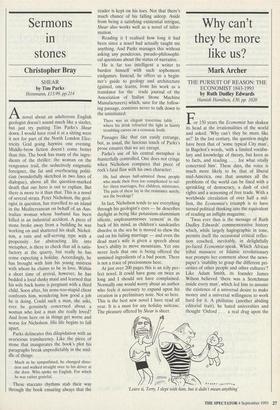Sermons in stones
Christopher Bray
SHEAR Anovel about an adulterous English geologist doesn't sound much like a sizzler, but just try putting Tim Parks's Shear down. I would have read it at a sitting were it not for part of the North London Elec- tricity Grid going haywire one evening. Middle-brow fiction doesn't come better than this. The book has many of the ingre- dients of the thriller: the woman on the vengeance trail, the seductively enigmatic foreigner, the fat and overbearing politi- cian (wonderfully sketched in two lines of dialogue), above all the question-marked death that our hero is out to explain. But there is more to it than that. This is a novel of several strata. Peter Nicholson, the geol- ogist in question, has travelled to an island in the Mediterranean on behalf of an Aus- tralian woman whose husband has been killed in an industrial accident. A piece of stone broke away from a building he was working on and shattered his skull. Nichol- son, a vain and self-serving type with a propensity for abstracting life into metaphor, is there to check that all is satis- factory at the quarry, but really he has come expecting a holiday. Accordingly, he has brought with him his young mistress with whom he claims to be in love. Within a short time of arrival, however, he has bedded a local dusky maid and learned that his wife back home is pregnant with a third child. Soon after, his none-too-stupid client confronts him, wondering how good a job he is doing. Could such a man, she asks, ever be genuinely concerned about a woman who lost a man she really loved? And from here on in things get worse and worse for Nicholson. His life begins to fall apart.
Parks delineates this dilapidation with an avaricious translucency. Like the piece of stone that inaugurates the book's plot his paragraphs break unpredictably in the mid- dle of things:
Much as he sympathised, he changed direc- tion and walked straight over to his driver at the door. Who spoke no English. For which he was rather grateful.
These staccato rhythms stab their way through the book ensuring always that the
reader is kept on his toes. Not that there's much chance of his falling asleep. Aside from being a satisfying existential intrigue, Shear also works well as a novel of infor- mation.
Reading it I realised how long it had been since a novel had actually taught me anything. And Parks manages this without asking any ponderous, pseudo-philosophi- cal questions about the status of narrative.
He is far too intelligent a writer to burden himself with such sophomore endgames. Instead, he offers us a begin- ner's guide to geology and architecture (gained, one learns, from his work as a translator for the trade journal of the Association of Italian Stone Machine Manufacturers) which, save for the follow- ing passage, contrives never to talk down to the uninitiated:
There was an elegant travertine table . . where his drink refracted the light in faintly trembling curves on a cenozoic froth.
Passages like that can easily estrange, but, as usual, the luscious touch of Parks's prose ensures that we are enrapt.
Parks's use of his central metaphor is masterfully controlled. One does not cringe when Nicholson compares that piece of rock's fatal flaw with his own character:
He had always half-admired those people who made their lives too complicated to suf- fer: three marriages, five children, mistresses. The pain of shear lay in the resistance surely, not the breakage?
In fact, Nicholson tends to see everything through his geologist's eyes — he describes daylight as being like potassium-aluminium silicate, unpleasantnesses 'cement' in the back of his mind, as children's sandcastles dissolve in the sea he is moved to chew the cud on his failing marriage — and even the dead man's wife is given a speech about love's ability to move mountains. Yet one never feels that one is being offered the unmixed ingredients of a bad poem. There is not a trace of preciousness here.
At just over 200 pages this is an icily per- fect novel. It could have gone on twice as long and I should not have complained. Normally one would worry about an author who feels it necessary to expand upon his creation in a preliminary note. Not so here. This is the best new novel I have read all year. It is a must for any holiday suitcase. The pleasure offered by Shear is sheer.
`Leave it, Terry, I slept with him, but it didn't mean anything'


















































 Previous page
Previous page